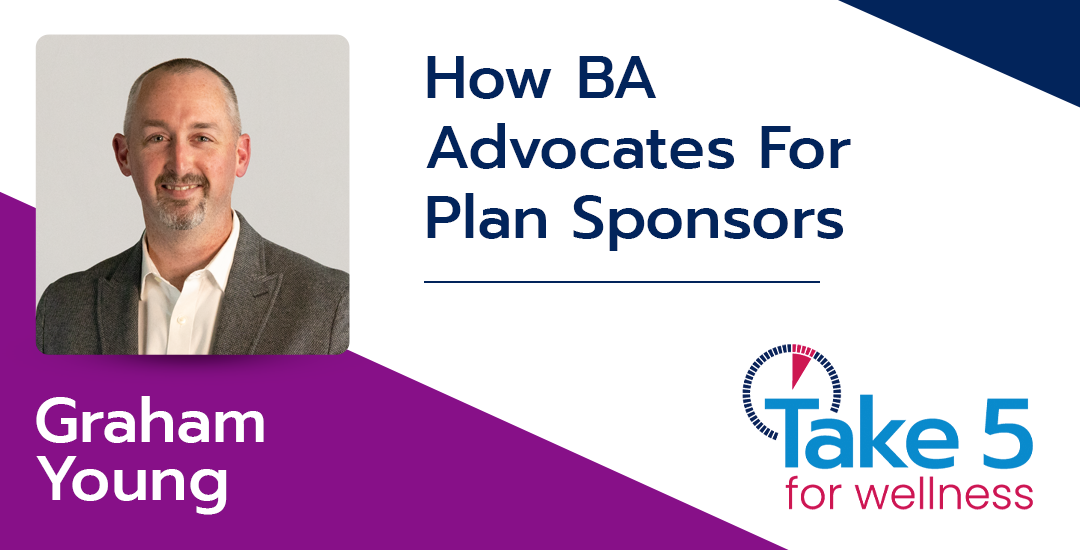Q&A with Graham Young, Board Chair – Benefits Alliance
Not sure what Benefits Alliance (BA) is all about? Graham Young, the new Board Chair for Benefits Alliance—whose day job is the Employee Benefits Director at CAPCORP in Ottawa—is happy to help shed some light.
Part of BA’s mandate is more advocacy. Why is that?
We feel there’s no voice right now for benefits and pension advisors and plan sponsors. The only plan sponsors at the government table are mega-corporations. They don’t represent small- to medium-sized enterprises in Canada. These private organizations need representation on taxation around benefits, pensions, National Pharmacare, changes in Employment Insurance (EI) and so much more. Their voice is missing.
What’s your primary goal in the role of Board Chair?
I want to double down on boosting the visibility of Benefits Alliance. BA is a national not-for-profit organization. Its members are independent group benefits and pension advisory firms that have come together to pool resources and strategize on common issues in order to better serve our clients. Plan sponsors are benefitting from the collective knowledge and leverage that we have in the industry—but they don’t know what BA is. We want to remedy that and take even more of a leadership role in the marketplace.
There continues to be a lack of information about the changes to EI. Any updates?
We’re pressing for clarity on the details—for example, what’s the impact on the Premium Reduction Program for plan sponsors with short-term disability plans? What about companies that have long-term disability integrated with EI? And what paperwork is required? No response yet, but we’ll keep pressing.
What about the Canadian Dental Care Plan–BA has been vocal about its rollout. Do you have concerns about how it will impact plan sponsors?
We want to make sure it’s efficient because nobody as a taxpayer wants things to be duplicated. And any reporting by employers should not be an administrative burden. We also want to ensure that the government understands that many employers will continue to offer their dental plans, which are highly valued by Canadians and likely richer than the coming federal plan. The national plan is for people without any coverage, which is excellent, but why is the government not doing more to incentivize employers to keep taking care of their employees in this way?
Drugs for rare diseases remain a big concern for plan sponsors, given their threat to the sustainability of private drug plans. Is this an area BA will address?
This is definitely a critical concern for benefits plans. Employers shouldn’t have to choose between excluding these drugs from the plan or scrapping the plan altogether. We are all for a national strategy to handle these rare drugs. But if the new government program only helps people who use provincial programs for catastrophic drug costs, that’s still leaving employers in the lurch. And what will happen is they will start trimming back their coverage, pushing people to these provincial plans. BA intends to be at the table to make sure the new national strategy is done well.
BA submitted feedback on proposed revisions to Canada’s Capital Accumulation Plan (CAP) Guidelines. What would you like to highlight for plan sponsors?
The CAP guidelines outline best practices for organizations with a group retirement or savings program. Plan sponsors are responsible for the administrative requirements of group plans and facilitating education and communication to empower plan members. That’s fine, but the proposed changes appear to shift the burden of member engagement from the members themselves to the plan sponsor. While improved member engagement is important, it seems the role of the plan sponsor is getting more complicated. It will be more important than ever for plan sponsors to work with their advisors to ensure they are able to meet and even exceed expectations for member engagement.
BA also recently participated in consultations in Saskatchewan on its proposed regulations for financial planners and financial advisors. What can you tell us about that?
There are important distinctions to be made between financial planners and financial advisors, and each must be regulated accordingly so that consumers and investors can have confidence that the individuals using these titles hold appropriate credentials. We are advocating strongly for title protection and for all provinces to be on the same page. I believe we’ve made some headway in Saskatchewan, which was receptive to our submission.
How will BA continue to elevate its profile?
We’d like to become more active with the insurance carriers and their associations and involve more benefits and pension advisors who are not members of BA in our events. We’d like to be seen as that knowledgeable voice in the industry and in order to do that we need to share some of our resources and events. If we want to be the voice of the industry, we have to connect with the industry.
